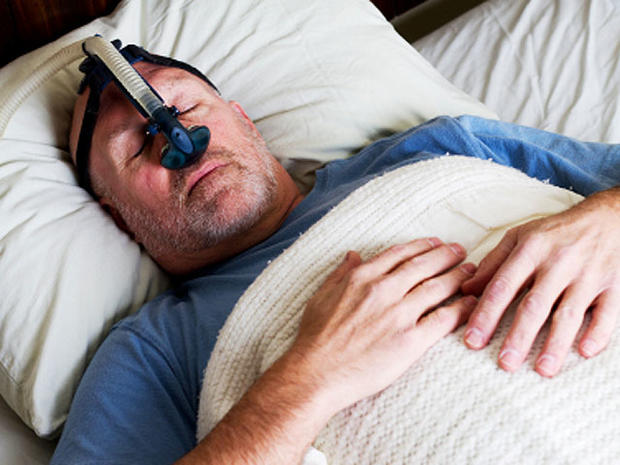Sleep Apnea "Pacemaker" Zaps Tongue for Better Sleep: Will It Work?
(CBS/AP) A pacemaker for the tongue?
What sounds like science fiction might prove to be a cure for obstructive sleep apnea, a dangerous sleep disorder that affects millions of Americans.
Scientists are starting to test a device designed to stop apnea by zapping the tongue during sleep. The idea is to stop the tongue and throat muscles from relaxing so much that they collapse and block breathing. For people with apnea, that can happen for 30 seconds or so, causing them to jerk awake and gasp - a cycle that repeats itself 30 or more times an hour.
The repeated awakenings deprive apnea sufferers of crucial deep sleep, raising their risk for car crashes and potentially deadly diseases. Apnea is also associated with loud snoring, which can disrupt the sleep of an apnea sufferer's bed partner.
By the end of January, Minneapolis-based Inspire Medical Systems plans to begin enrolling 100 apnea patients in a study to see if so-called hypoglossal nerve stimulation really works. Two competitors are developing similar implants: San Diego-based ImThera Medical and Apnex Medical of St. Paul, Minn.
"In this kind of research, we're not looking for little changes," says Dr. Meir Kryger, a sleep medicine specialist at Gaylord Hospital in Connecticut, who is helping to lead the study. "What we're looking for is actually cure."
More than 12 million Americans have obstructive sleep apnea. It is particularly common in overweight people and middle-aged men, but anyone can have it.
Today the best treatment for apnea is continuous positive airway pressure (CPAP), which employs a mask that gently blows air through the nose to keep airways open during sleep. But studies suggest at least 30 percent of diagnosed apnea patients won't or can't use CPAP. They cite masks that fit poorly and leak, or say they feel claustrophobic, or rip them off while tossing and turning during the night.
Yet going untreated is risky. Apnea raises the risk for high blood pressure, heart attack, stroke, and diabetes. More immediately, severe apnea increases the chance of a car crash sevenfold.
Surgeons sometimes try removing part of the roof of the mouth or other soft tissue to treat apnea. But it's hard to predict when these tricky operations help, so they're usually reserved for the most severe cases.
"It got to the point where I'd dread going to bed," says Rik Krohn, 67, of suburban Minneapolis. His apnea was awakening him an average of 35 times an hour. He tried five CPAP masks before giving up in frustration, and surgeons turned him away.
Enter hypoglossal nerve stimulation.
With Inspire's system, doctors implant a small generator near the collarbone and snake a wire up under the jaw to that tongue-controlling nerve. A sensor at the diaphragm detects when a patient inhales, signaling the implant to zap the nerve. Researchers adjust the power so that the nerve is stimulated just enough to keep the tongue from falling backward during sleep.
"I don't have any idea while I'm sleeping that it's on," says Krohn, the Minnesota man who'd given up on apnea treatment until volunteering for an early Inspire study last year - and says he now gets a good night's sleep. "It's a game-changer for me."
Of course, the device is experimental. Frustrated patients should try some proven steps first, cautions Dr. Amy Atkeson of Columbia University Medical Center in New York.
Her advice: Don't give up on CPAP without first seeing an experienced sleep technician to adjust humidity levels and take other steps that not every CPAP prescriber knows to try. f you're overweight or obese, you should know that weight loss can help.

